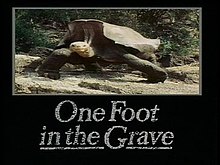| One Foot in the Grave | |
|---|---|
 Series title card (1990–2000) | |
| Created by | David Renwick |
| Written by | David Renwick |
| Directed by |
|
| Starring | |
| Composers |
|
| Country of origin | United Kingdom |
| Original language | English |
| No. of series | 6 |
| No. of episodes | 42 + 2 shorts (list of episodes) |
| Production | |
| Producers |
|
| Production locations | BBC Television centre. In and around Christchurch and Bournemouth, Dorset, England |
| Running time | 27–92 minutes |
| Production company | BBC |
| Original release | |
| Network | BBC One |
| Release | 4 January 1990 – 20 November 2000 |
| Related | |
| Cosby | |
| Infobox instructions (only shown in preview) | |
One Foot in the Grave is a British television sitcom[1] written by David Renwick. There were six series (each consisting of six half-hour episodes) and seven Christmas specials over a period of ten years from early 1990 to late 2000. The first five series were broadcast between January 1990 and January 1995. For the next five years, the show appeared only as Christmas specials, followed by the sixth and final series in 2000.
The series features the exploits of Victor Meldrew, played by Richard Wilson, and his long-suffering wife, Margaret, played by Annette Crosbie. Wilson initially turned down the part of Meldrew and David Renwick considered Les Dawson for the role, until Wilson changed his mind.[2] The programmes invariably deal with Meldrew's battle against a long series of problems, some of which he creates for himself.
The location is set in an unnamed town in Southern England, where Victor takes involuntary early retirement. His various efforts to keep himself busy while encountering various misfortunes and misunderstandings are the themes of the sitcom. Indoor scenes were filmed at BBC Television Centre with most exterior scenes filmed on Tresillian Way in Walkford in Christchurch, Dorset.[3] Despite its traditional production, the series subverts its domestic sitcom setting with elements of black humour and surrealism.
The series was occasionally the subject of controversy for some of its darker story elements, but nevertheless received a number of awards, including the 1992 BAFTA for Best Comedy. The programme came 80th in the British Film Institute's 100 Greatest British Television Programmes.[4] Four episodes were remade for BBC Radio 2.[5] The series inspired a novel, published in 1992, featuring the most memorable moments from the first two series and the first Christmas special.
- ^ Patterson, Johno (13 December 2013). "10 Dark British Comedy TV Shows That Must Be Seen". WhatCulture.com. Retrieved 30 April 2020.
- ^ Plunkett, John (26 July 2016). "I don't believe it! Victor Meldrew role almost went to Les Dawson". The Guardian. Retrieved 30 April 2020.
- ^ One Foot in the Grave Series 6 DVD Commentary
- ^ "BFI TV 100 - the Top Ten (2000)". Archived from the original on 12 June 2020. Retrieved 9 May 2023.
- ^ Lewisohn, Mark. "One Foot in the Grave". The former BBC Guide to Comedy. Retrieved 2 May 2019.